 Do you plan to set up an e-commerce site, or sell goods or services online? If so, then you should think about providing users with the convenience of currency conversion on your web site.
Do you plan to set up an e-commerce site, or sell goods or services online? If so, then you should think about providing users with the convenience of currency conversion on your web site.
Currency conversion allows your prospects to translate foreign currency pricing into their home currency when purchasing or checking out products on e-commerce sites. It also lets visitors and customers see the exact amount their card or PayPal account will be charged, displayed in their local currency.
One benefit of showing currency conversion on your website is that it allows customers to see and understand pricing in foreign countries in their own local currency, and makes it easier for visitors to work out their costs and expenses.
Fortunately, if you are a WordPress user, it’s easy to add a currency conversion plugin to currency conversion to your site via a plugin, allowing your site visitors to quickly and easily perform currency conversions to determine the cost of your products.
Currencyr
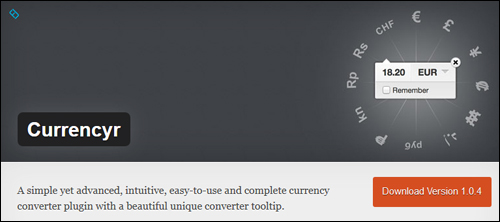
Currencyr is a simple yet advanced, intuitive, easy-to-use and complete currency converter WordPress plugin with a unique and attractive converter tooltip. And, it’s also free to install and use on your web site.
The Currencyr currency conversion WordPress plugin features:
- Inline converter
- Supports a number of exchange rates providers, like Yahoo!, Google, Open Exchange Rates, European Central Bank and FoxRates
- WP-Cron task scheduler enabled
- Widgetized currency table and converter
- Can be integrated with various online shopping plugins such as WooCommerce, WP-eCommerce, Shopp, and Easy Digital Downloads.
- Automatic local currency detection
- Translation support
Note: This plugin needs PHP 5.3.0 or later. Do not install this plugin if you currently have an older version of PHP installed on your server. Alternatively, ask your web hosting support team to check and upgrade your PHP.
***
You can install the Currencyr plugin from your WP dashboard by typing in “currencyr” into the Plugins search field and clicking “Install Now” …
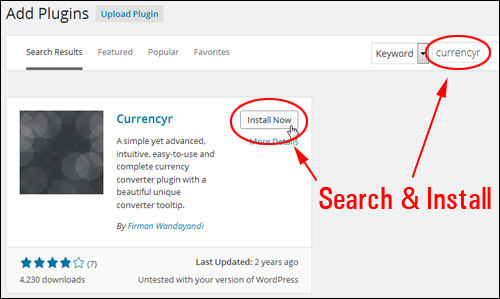
After installing and activating the plugin, you can visit the plugin’s settings by selecting Currencyr from your WordPress admin area …
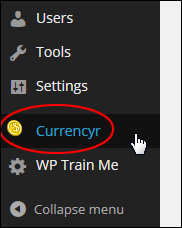
The plugin settings section offers you various configuration settings …
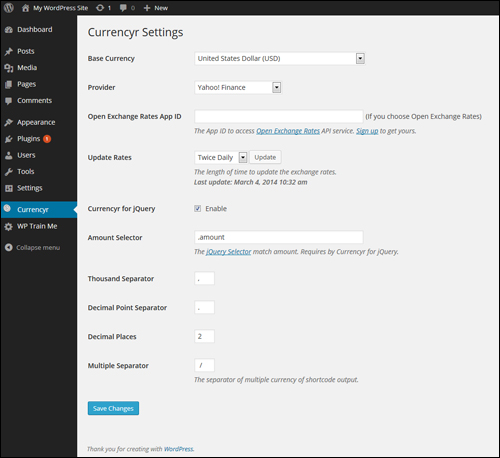
For example, you can select a base currency from the ‘Base Currency’ drop-down menu. The default option is ‘USD’ …
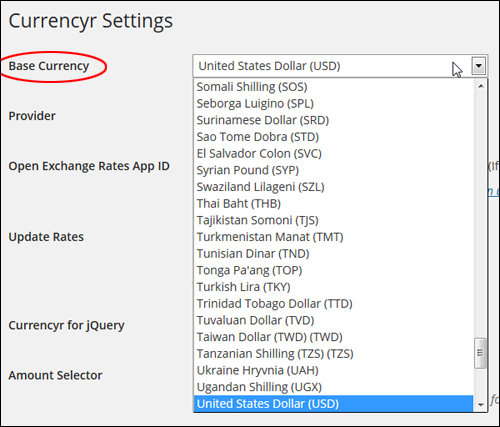
Similarly, you can select which data provider you want to use from a drop-down menu. The default provider is Yahoo Finance, but you can select another option, like FoxRate or Open Exchange Rates …

Note: If you select ‘Open Exchange Rates’, you will need an API (Application Programming Interface) ID …

You can select how frequently you would like the exchange rates to be updated by selecting an option from the Update Rates dropdown menu …

The plugin uses jQuery, which allows web developers to add things like animation effects to web applications (such as WordPress plugins).
If you have no reason to modify the jQuery settings, you can simply ignore this setting …

Edit the rest of the settings and don’t forget to click Save Changes when finished …
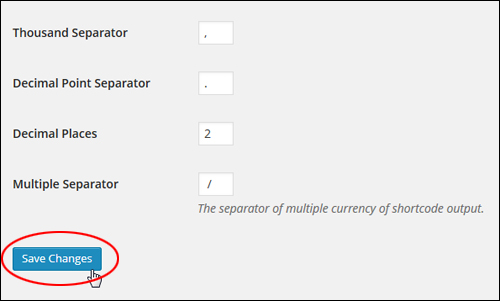
Once your plugin settings have been configured, you can start adding currency conversion to any WP post using shortcodes.
Refer to the ‘Additional Plugin Notes’ section below to learn how to use currency codes (e.g. USD, AUD, CAD, etc …) in this plugin.
How To Use Shortcodes
You can easily insert currency conversion into WP pages, posts and widgets with no coding knowledge using shortcodes.
Here are some examples of currency shortcodes that you can add to WordPress pages and posts:
Let’s say that you retail goods online for a fixed amount (e.g. $175) in US Dollars (USD), and you want to display the price converted into British pounds (GBP) on your product information page.
To display this information, you simply need to add the following shortcode to your post or page …

Note: You can also insert amounts in dollars and cents (e.g. 19.95, 197.00, 149.00, etc …)
The example below shows how the shortcode looks after you have added it to a post or page …
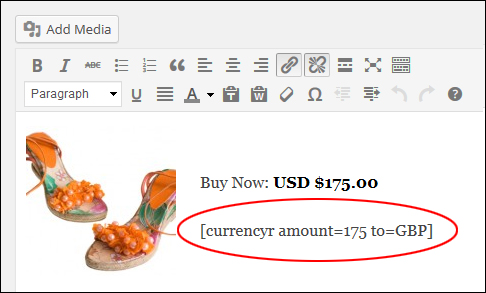
After the post or page has been published, the converted currency will then appear as shown in the screenshot below …
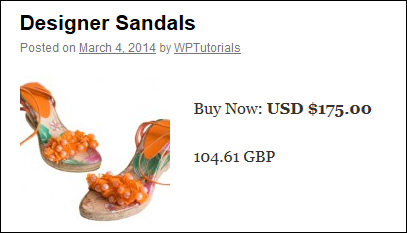
Using this example, let’s now translate the same amount into different currencies.
To do this, use following shortcode (add as many currency symbols as you want separated by vertical pipes) …

You can see how the above shortcode looks when inserted into a page …

Once your information has been published, the currency conversion will then display as shown below …
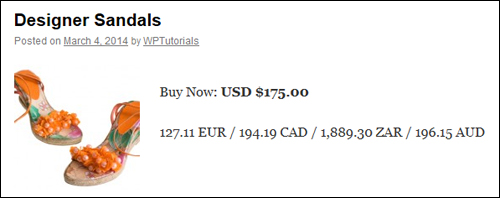
refer to the ‘Additional Plugin Notes’ section at the end of this tutorial to learn how to change the currency separator symbol with the Currencyr plugin.
Now, let’s say that you want to use a different base currency than the one set as your default.
For example, say you have set your default base currency as EUR and you have a section on your e-commerce pages targeted to visitors in countries like Australia or Canada, you can change the base currency using the following shortcode …

You can see how the shortcode appears when you add it to your content …
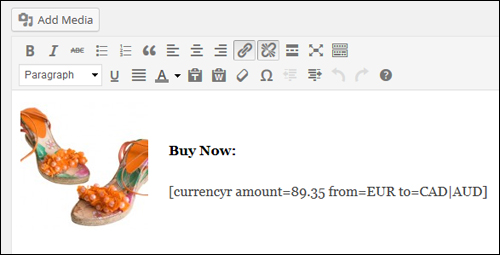
Once the information has been published, the converted currency will then display as shown in the screenshot below …
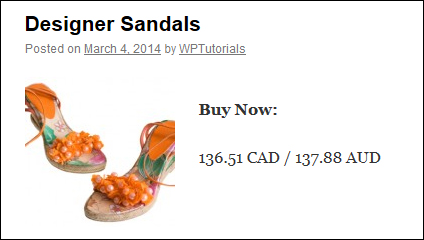
Plugin Widget
You can also add a currency converter to your website or blog’s sidebar area using the Currencyr widget.
To add currency conversion to your sidebar area, select Appearance > Widgets from your WordPress dashboard menu …
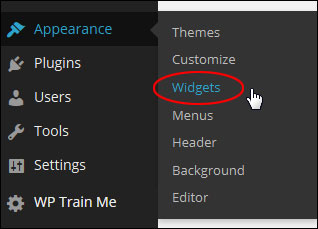
In the Widgets > Available Widgets area find the ‘Currencyr’ widget and add it to an ‘Active Widgets’ area …
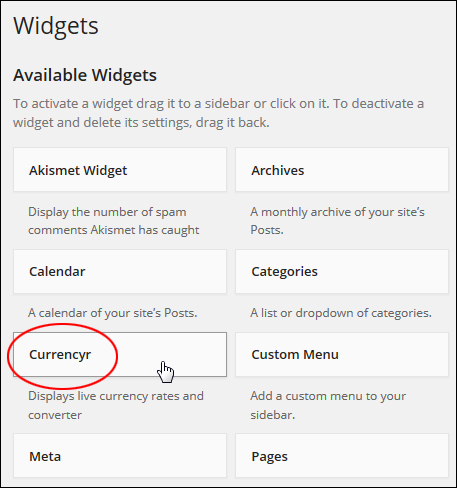
Configure the widget options as shown below (add currency codes separated by commas), and click ‘Save’ to save your settings …
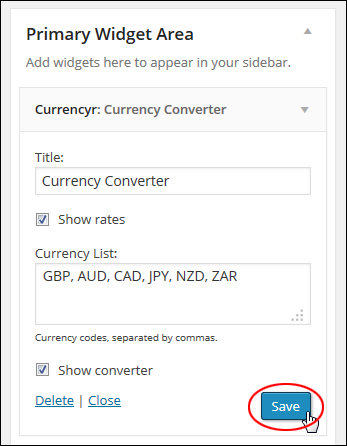
The currency conversion tool will now show on your site’s sidebar menu with the settings you have selected …
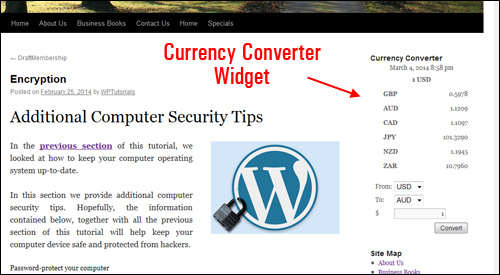
Additional Plugin Notes
Here are some additional notes and useful information about using the Currencyr plugin.
Currency Separator
The Currencyr plugin lets you specify a symbol of your choice to display as the currency separator when using several currencies.
You can select a different symbol in the Multiple Separator settings field.
So, for example, using the default symbol “/” (forward slash) …

Displays your currency values separated by a forward slash as you can see in the screenshot below …
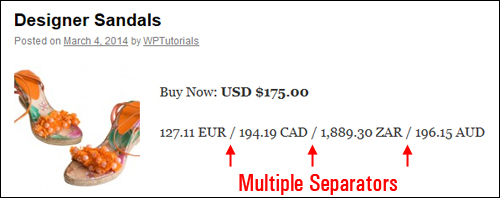
If you select another symbol and resave your plugin settings …

Your website visitors will see the new symbol used as the currency separator …
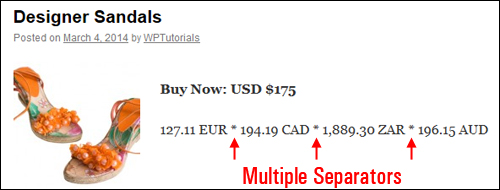
e-Commerce Software Integration
As described earlier, the plugin can be integrated with various WP-compatible e-commerce plugins such as WooCommerce, WP-eCommerce and Shopp …
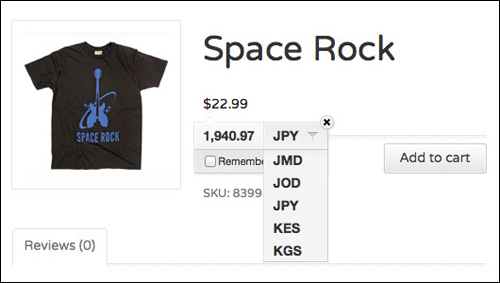
(image source: Currencyr plugin website)
And there you have it! Now you can go and easily add currency conversion to your e-commerce site.
To learn more about WordPress e-commerce plugins, see the tutorial below:
***
"I am beyond impressed with what you have put together. I can tell that you put a ton of hard work into building what you have. You have the absolute best content on WordPress I have ever seen!" - Robert T. Jillie